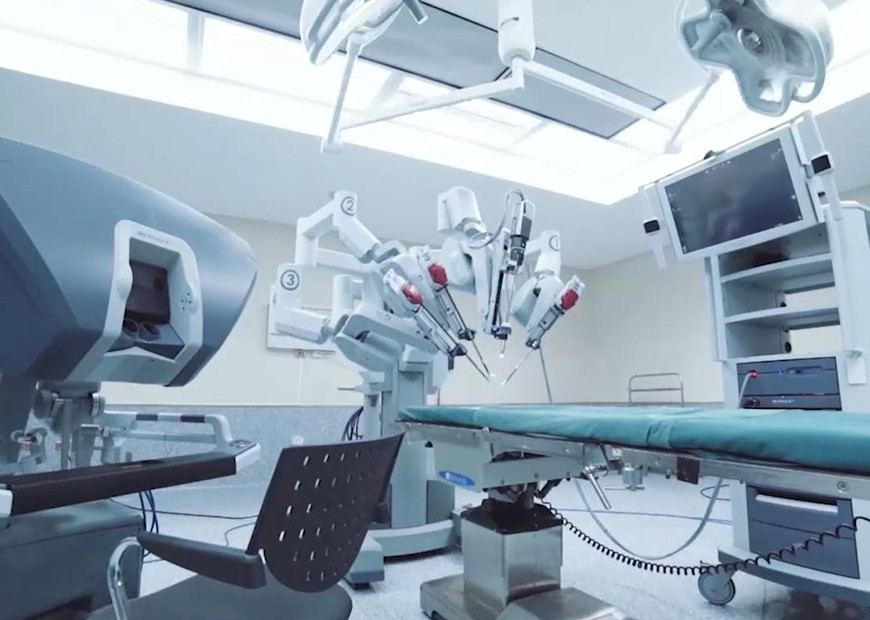How the latest medical advances help Filipino men overcome prostate cancer
The Robot-assisted Laparoscopic Prostatectomy (RALP) is currently the most advanced surgical procedure in treating prostate cancer.
According to the International Agency for Research and Cancer, prostate cancer is the third most common form of cancer among men in the Philippines, with roughly 12% suffering from prostate cancer.
The prostate is an important reproductive gland found in men that plays a vital role in the nourishment and transportation of seminal fluid. While important, the prostate can get afflicted by diseases, such as Benign Prostatic Hyperplasia (BPH), in which the prostate gland enlarges with age and may obstruct urination. Prostate cancer, in which prostate cells can become malignant, is another prostate disease.
“Prostate cancer is a relatively silent disease in its early stages,” Dr. Josefino Castillo, surgeon and head of St. Luke’s Medical Center (SLMC) Institute of Urology in Global City cautions.
“Typically, symptoms like obstructed or too-frequent urination, blood in the urine, or other symptoms spread to other parts of the body, like bone pains, arise later in the course of the disease. Fortunately, we have ways to screen even asymptomatic patients for the disease, to catch the disease in early stages and prevent progression.”
Given the prevalence of this disease and the ways it can be caught early before progression, Filipino men need reliable healthcare partners to guide them through health education, screening, diagnosis, and treatment.
Through its highly trained urologists and advanced medical technology, St. Luke’s Institute of Urology has been a leader in the detection, diagnosis, and advanced treatment of prostate cancer for years. Its surgeons are highly equipped to manage prostate cancer in all of its stages, especially in stages amenable to surgical treatment, such as prostatectomy, or the removal of the prostate gland.
A patient who has benefited from SLMC’s expertise is Jhune San Jose, a father of four children and a stage two prostate cancer survivor. Though based in Singapore, he chose to go back to the Philippines to undergo Robot-assisted Laparoscopic Prostatectomy (RALP) at SLMC.
“I have done my own research and St. Luke’s has one of the highest success rates in this kind of operation. [RALP] is less invasive and offers a very quick recovery. That’s why I went for it and I’m very confident it will be a success,” Mr. San Jose said. “Being robot-assisted, it’s the technology now, everything is moving in that direction so I strongly believe we should go with the highest technology available. It makes me confident that I am lucky as well that we have this technology during this time I have to undergo this surgery.”
Jhune San Jose is one of the many Filipino men whose prostate cancer has been managed through the advanced Robot-assisted Laparoscopic Prostatectomy (RALP) procedure.
RALP is considered a minimally invasive approach to the procedure of radical prostatectomy, which is the removal of a malignant prostate gland. It is currently the most advanced surgical procedure in treating prostate cancer.
During operation, a surgeon operates several robotic arms that make small yet highly precise incisions, providing minimal scarring, less blood loss, and earlier recovery for the patient. Studies have also shown that compared to conventional approaches, RALP also provides better recovery of erectile function and urinary continence post-prostate removal.
Prior to his RALP procedure, San Jose also underwent KOELIS MRI/Ultrasound Fusion Biopsy at St. Luke’s. KOELIS, an advanced biopsy technique which makes use of MRI images fused with ultrasound guidance, goes hand-in-hand with RALP because it is an advanced screening procedure that accurately detects suspicious areas in the prostate. This facilitates targeted biopsy of these areas for more accurate diagnosis.
“Prostate cancer, unlike other cancers, can be detectable at its earliest stages, even among patients with no symptoms, which is why we encourage our patients to get screened and if necessary, to undergo a biopsy,” says Dr. Diosdado Limjoco, head of SLMC Institute of Urology in Quezon City. “KOELIS MRI/Ultrasound Fusion Biopsy of the prostate allows better outcomes. It allows more targeted biopsies, more accurate diagnosis, and because of its technique, a lower risk for post-procedural infection.”
To encourage prostate screening among eligible men, SLMC is offering a 15% discount for three prostate cancer screening and detection procedures: the Prostate Specific Antigen (PSA) Blood test; multiparametric MRI of the prostate; and the KOELIS MRI/Ultrasound Fusion Biopsy of the prostate. The PSA blood test is the most basic screening procedure that detects rises in the body chemical PSA, indicating prostate disease or malignancy. Multiparametric MRI of the prostate, on the other hand, detects areas suspicious for malignancy in the prostate. If advised by a physician to undergo MRI, interested patients may also avail of the 15% promotion.
For those who are in the advanced stages of screening, the MRI Fusion Biopsy available at SLMC-Global City will also be part of this promotion. Patients undergoing this procedure will also be entitled to a free COVID-19 RT PCR test beforehand to ensure their safety.
The promo will run from June 14 to July 14, 2021. Patients who have paid during this period may book their appointments for the procedure of choice until August 31, 2021.
For inquiries on prostate cancer screening and treatment, please contact the Institute of Urology at 8-789 7700 loc. 7044 (SLMC-Global City) or at 8-723 0101 loc. 5425 (SLMC-Quezon City).





